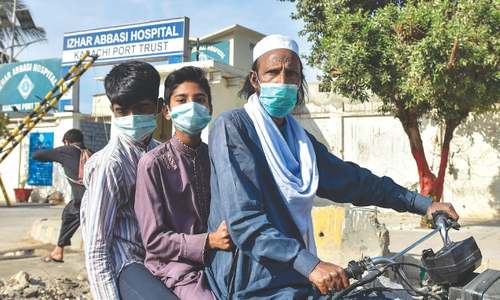The Sindh health department on Wednesday issued an advisory on soybean dust allergy, after 14 people from Karachi's Keamari area died while countless others were hospitalised due to reportedly inhaling toxic gas.
On Tuesday, the International Centre for Chemical and Biological Sciences (ICCBS) had advised the government to consider "exposure to soybean dust (aeroallergens)" as a cause of breathing difficulties being faced by residents of Keamari area.
In a letter sent to Karachi Commissioner Iftikhar Shallwani, ICCBS Director Iqbal Choudhary had said that the lab had examined blood and urine samples of people "exposed to toxic aerosols" as well as soybean dust samples collected from the port area.
He had maintained that while the ICCBS was still "extensively engaged in deciphering the cause of this toxic exposure", the findings so far suggested that the symptoms being experienced by Keamari residents are a result of "overexposure to soybean dust".
The advisory, a copy of which is available with Dawn.com, stated that soybean allergy, is " a form of severe allergy which causes a severe asthma attack in persons who come into direct contact with soya dust” and “can cause severe anaphylactic shock and death in those who are already asthmatic”.
The advisory also urged hospital officials to take the necessary steps, including training staff and ensuring the availability of medicines, adding that since it is an allergic reaction, it can be treated using antihistamines.
According to the document, a soy allergy is a common food allergy. “Often a soy allergy starts in infancy with a reaction to soy-based infant formula. Although most children outgrow the allergy, some carry it into adulthood.”
It added that for most people, a soy allergy is uncomfortable but not serious. “Rarely, can an allergic reaction to soy be frightening or even life threatening,” it said, adding that signs and symptoms of a food allergy usually develop within a few minutes to hours after being exposed to an allergen.
According to the document, tingling in the mouth, hives, swollen lips, face, tongue and limbs, wheezing or difficulty breathing, abdominal pain, diarrhea, and nausea or vomiting are some of the symptoms of a mild soy allergy.
On the other hand, the symptoms of a severe allergic reaction include difficulty in breathing, caused by the throat swelling up, a drop in blood pressure, dizziness or unconsciousness, as well as drooling and an inability to swallow.
"A severe allergic reaction is most likely to occur in people who have asthma or are allergic to other foods, such as peanuts," it clarified. The advisory also highlighted that certain factors, such as family history and age, also put citizens at risk of developing a soy allergy.
Giving guidelines for prevention, the Sindh health department advised citizens with asthma to wear masks, wash hands, eyes and face with water, drink ample amount of water, and rush to the hospital in case of an allergic reaction or dizziness.














































